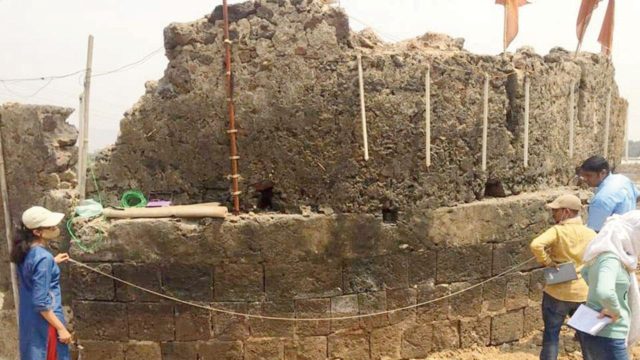The discovery of perhaps the largest-surviving part of a Portuguese-era bastion in Mumbai city limits, a nearly 400-year-old relic near Wadala, next to the Eastern Freeway, has had archaeologists and history buffs excited. It was documented and listed by a team of the Directorate of Archaeology and Museums, Maharashtra government, on Wednesday evening. The bastion will now be listed and protected by the directorate.
Located next to Freeway, it is shown in British maps of 1812, 1843 and 1885, but could be older
– DIRECTORATE OF ARCHAEOLOGY AND MUSEUMS OFFICER
‘Buried under debris’
The Portuguese ruled over the city from circa 1534 to 1661 and gifted Bombay to the British Crown as part of the dowry of Queen Catherine of Braganza in 1661. “This Portuguese period bastion in the saltpans at Wadala is shown in the British period maps of the years 1812, 1843 and 1885 and has been there since much earlier. I was searching for it for a long time but could not spot it as it was buried under debris. Fortunately, local heritage enthusiasts spotted it and removed the debris to make its external features clear. This paved the way for this bastion’s discovery,” said officer Mayur Thakare from the Directorate of Archaeology and Museums, who visited the site along with his team.
“It is perhaps the largest surviving Portuguese period bastion in the city limits of Mumbai. It has some unique features like a water storage tank-like structure which is rare in the Portuguese defence structures. Once it is exposed completely, we can talk more about its structural development and its features,” he added.
‘Could be a Martello tower’
“My friend Vivek Bhinge first told me about a relic near my home and I and my friend Akshay Shinde visited the site out of curiosity. We took the help of local Shiv Sena leader Samadhan Jugdhar and his team to clear the debris and dig out what is part of a tower and what we discovered was something very unique. We have referred to it as a Martello tower or Martellos, small defensive forts that were built during the 19th century,” history enthusiast Chandan Vichare said.
Heritage buff Bharat Gothoskar said he had first spotted the relic about 15 years ago during the construction of the Eastern Freeway and had documented its location and mapped it. “It is spotted in the maps of 1812, 1843 and 1873. In those days, there was a waterway from Mahim to Sewri passing by it. So it must probably be to keep a tab on the boats,” he said.
On Wednesday, the team of officials noted the findings, took measurements and documented it for a report. The metal parts, nuts found have also been measured and will be investigated. “It must be protected given that it is one of the only of its kind after the small watchtower at Sion,” Thakare said.
What’s a bastion?
A projecting part of a fort built at an angle to the line of a wall, so as to allow defensive fire in several directions
Article and Image source : Mid-day.com








